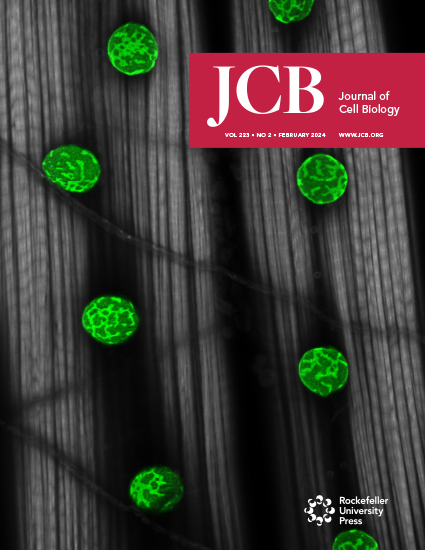酵母Mkt1/Pbp1复合体促进呼吸生长的适应性反应。
IF 6.4
1区 生物学
Q1 CELL BIOLOGY
引用次数: 0
摘要
据报道,Rad2/XPG蛋白Mkt1 (Mkt1- g30d)的氨基酸多态性是实验室酵母线粒体表型变异的基础,但Mkt1的功能和多态性的影响尚不清楚。在AlphaFold结构预测的指导下,我们通过遗传学和生化分析证实,Mkt1与Pbp1形成复合物,Pbp1是一种信使RNP蛋白,支持对呼吸条件的适应,如Pumilio蛋白puf3依赖性线粒体蛋白表达和torc1依赖性自噬。使用岑。我们发现,与Pbp1一样,Mkt1也是呼吸生长过程中puf3依赖性线粒体蛋白表达和自噬所必需的。值得注意的是,我们发现Mkt1- g30d突变破坏了Mkt1/Pbp1复合物的稳定性,这有助于解释其功能丧失效应。HAP1+ S288C菌株在线粒体生物发生和自噬方面存在缺陷,通过用Mkt1-G30等位基因替换Mkt1-D30等位基因来修复这些缺陷。因此,Mkt1/Pbp1复合物支持呼吸生长过程中的适应性过程,Mkt1- g30d突变是一种进化适应,通过破坏Mkt1/Pbp1复合物的稳定来调节呼吸过程。本文章由计算机程序翻译,如有差异,请以英文原文为准。
The yeast Mkt1/Pbp1 complex promotes adaptive responses to respiratory growth.
An amino acid polymorphism in the Rad2/XPG protein Mkt1 (Mkt1-G30D) reportedly underlies variation in mitochondrial phenotypes among laboratory yeast, but the function of Mkt1 and the effects of the polymorphism are unknown. We confirm with genetics and biochemical assays guided by AlphaFold structure predictions that Mkt1 forms a complex with Pbp1, a messenger RNP protein that supports adaptations to respiratory conditions, such as Pumilio protein Puf3-dependent mitochondrial protein expression and TORC1-dependent autophagy. Using CEN.PK (Mkt1-G30) yeast, we show that, like Pbp1, Mkt1 is required for Puf3-dependent mitochondrial protein expression and autophagy during respiratory growth. Notably, we found the Mkt1-G30D mutation destabilizes the Mkt1/Pbp1 complex, helping to explain its loss-of-function effects. A HAP1+ S288C strain exhibited defects in mitochondrial biogenesis and autophagy, which were rescued by replacing its Mkt1-D30 allele with the Mkt1-G30 allele. Thus, the Mkt1/Pbp1 complex supports adaptive processes during respiratory growth, and the Mkt1-G30D mutation is an evolutionary adaptation that tempers respiratory processes by destabilizing the Mkt1/Pbp1 complex.
求助全文
通过发布文献求助,成功后即可免费获取论文全文。
去求助
来源期刊

Journal of Cell Biology
生物-细胞生物学
CiteScore
12.60
自引率
2.60%
发文量
213
审稿时长
1 months
期刊介绍:
The Journal of Cell Biology (JCB) is a comprehensive journal dedicated to publishing original discoveries across all realms of cell biology. We invite papers presenting novel cellular or molecular advancements in various domains of basic cell biology, along with applied cell biology research in diverse systems such as immunology, neurobiology, metabolism, virology, developmental biology, and plant biology. We enthusiastically welcome submissions showcasing significant findings of interest to cell biologists, irrespective of the experimental approach.
 求助内容:
求助内容: 应助结果提醒方式:
应助结果提醒方式:


